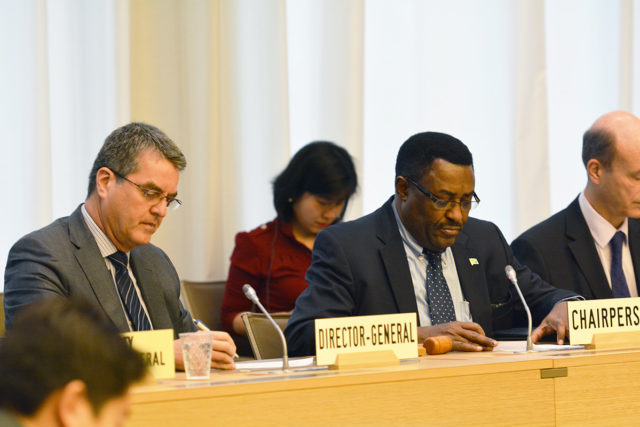
The Council for Trade-Related Aspects of Intellectual Property Rights (TRIPS) met on 30 January to mark the entry into force of the first amendment to World Trade Organization rules since the organization was established. The amendment secures a legal pathway to ease access to affordable medicines in developing countries that mostly rely on imports for their medicinal needs.
“The entry into force of the TRIPS amendment is a milestone in the WTO’s comparatively short history,” said the Chair of the TRIPS Council, Ambassador Modest Jonathan Mero of Tanzania. “The amendment provides a secure legal pathway to access affordable medicines and puts this new procurement tool on a par with other TRIPS flexibilities directly relevant to public health,” he said. He was joined by many delegations in calling upon members that are yet to accept the amendment to do so expeditiously.
An amendment to the agreement on intellectual property entered into force on 23 January, once two-thirds of WTO members had accepted the legal change. The amendment gives legal certainty that generic versions of patent-protected medicines can be produced under compulsory licences specifically for export to countries with limited or no pharmaceutical production capacity.
In his address to WTO members, Director-General Roberto Azevêdo said: “This is the very first amendment to WTO multilateral law, the first to be agreed among all members, and the first to come into force. It is significant that this first amendment is not about pursuing trade opportunities or market access for their own sake. Rather, its aim is to enhance access to medicines by the most vulnerable countries and overturn a situation in which the poorest could face the biggest hurdles in accessing essential drugs.”
DG Azevêdo stressed that, looking ahead, “our collective tasks are to step up practical support for those members who wish to make use of the system, to focus our attention on how to implement the system, and on how to identify the actual procurement scenarios for which the system is the optimal solution.”
Benin, speaking on behalf of the least-developed countries (LDC) group, praised the amendment as “a legal response to difficulties of access to medicines to treat diseases affecting hundreds of millions of people … in developing countries and, in particular, in least-developed countries”. It noted that “the amendment demonstrates that international trade rules take account of the development dimension and contributes to the achievement of the Sustainable Development Goals”.
Bangladesh stressed the human rights dimension of the TRIPS amendment. It said that “medication for cure of diseases is a primary need for people living in developed, developing and least developed countries. Now, the WTO TRIPS Agreement, with its new amendment, ranks alongside important international instruments to ensure health and happiness for all.”
A number of delegations called for a constructive debate in the TRIPS Council to ensure that the mechanism works as effectively as possible and delivers practical results. This would help to demonstrate that trade can support objectives such as protecting public health.
All delegations taking the floor welcomed entry into force of the amendment. Some underlined the need for its effective implementation; several emphasized the contribution of the intellectual property system to sustaining pharmaceutical innovation. “The challenges are how to promote affordable access to medicine without negatively affecting the research and development by the pharmaceutical industry and therefore the availability of new and innovative medicines,” the European Union noted.
Discussing the challenge of ensuring access to medicines, several delegations pointed out that intellectual property was only one factor among many: they observed that most essential medicines are already available in generic form, yet do not reach those in need because of factors including high tariffs, taxes and mark-ups or inefficient procurement processes and the costs related to trade. – WTO








